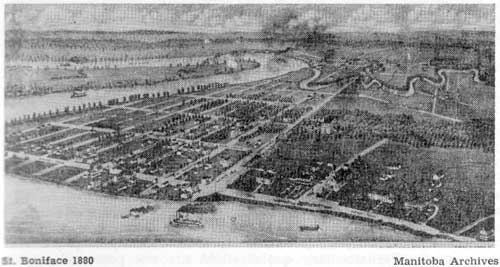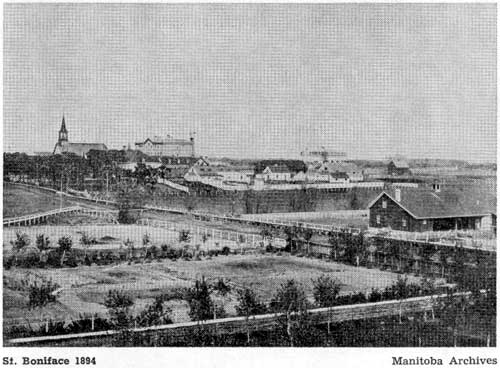by W. Fraser Rae
Manitoba Pageant, Autumn 1965, Volume 11, Number 1
|
An excerpt from Fraser Rae's Newfoundland to Manitoba, 1881.
The settlement of French half-breeds at St. Boniface dates from the year 1818. Since then it has been the Roman Catholic mission centre of the North-West. Bishop Provencher laboured here as a priest from 1818 till his death as bishop in 1853. His successor, Archbishop Tache has spent the greater part of a long life as a missionary priest among the Indians. Archbishop Tache's work entitled Twenty Years of Missions in the North-West of America is not only an interesting record of personal experiences, but till recently it has been the only trustworthy guide to that obscure region. He is very popular, and his great authority over the Half-Breeds and the Indians is exercised with much discretion. He chiefly contributed to allay the irritation which occasioned and succeeded the rebellion headed by Louis Riel; and, though he was said to have rather strained his powers as a mediator by promising an absolution to the rebel leaders which the Canadian Government did not intend to accord, yet he unquestionably acted in good faith and with a success proving that his interpretation of the mission which he undertook was justified by events.
The most conspicuous buildings in the suburb of St. Boniface are connected with the church of which Archbishop Tache is a worthy representative. First in importance is the Cathedral, a stone building in simple Gothic style, and one of the best edifices of the kind in the North-West. Its organ is one of the finest in the country; it was a gift to the Archbishop from his friends in Quebec on the 25th anniversary of his accession to episcopal rank. The interior of the Cathedral is principally remarkable for the absence of the tawdry decorations which so often offend the eye in such places. The Archbishop's palace is close to the Cathedral, and is also built of stone. It is a plain, comfortable dwelling-place, with a well-kept garden in front, filled with flowering plants and trees. I had the pleasure of conversing with the Archbishop and of learning his views with regard to the settlement of the country. He has that polish of manner which seems to be the inheritance of most persons whose mother-tongue is French. Though no longer young and though much of his life has been passed among hardships which render a man old before his time, yet he has the look of a man much younger than his years. He is a living witness to the salubrity of the climate, having been here upwards of 30 years; his predecessor, Bishop Provencher, lived long enough to show that residence near the Red River was conducive to longevity.

St. Boniface, 1880
Source: Archives of Manitoba
Archbishop Tache has a strong faith in the progress of this region of the country and in its adaptability for settlement. Some parts further westward he considers too poor for cultivation, but he admits there is ample space and attraction for millions to take up their abodes and prosper. The task of civilizing the Indians he holds to be much less difficult than is commonly supposed, and the success which the missionaries of his Church have had among the Indian tribes between the Red River and the Rocky mountains is strongly in favour of the sanguine views entertained by the Archbishop. His own exertions to promote education are worthy of high praise and have yielded good fruit. Several educational and charitable institutions over which he exerts supervision are within a short distance of his palace. First there the College of St. Boniface, where the students number between 60 and 70; secondly, there is St. Boniface Academy for the education of girls, where the teachers are Sisters of Charity; thirdly, there is the Convent of St. Boniface, where orphans and destitute old women are cared for and supported by the Sisters; and fourthly, there is a hospital in connexion with the convent for the relief of the sick. Having read some extracts from the pastoral letter issued by Archbishop Tache at the time of the last general election in Canada, I was desirous of seeing the document itself, and, on stating this, the Archbishop kindly presented a copy to me. I shall translate a few passages from it in order to show the kind of advice which is given to electors by this excellent representative of the Catholic Church in the Canadian West.
He begins by claiming for priests, as citizens, the duty to take part in elections and the right to do so in virtue of their education and sacred office. He sets forth the importance of the elections on account of the results which may follow, and the necessity of having a well-constituted Legislature. He insists on the value of every vote in a Legislative Assembly, seeing that a single vote may turn the scale for good or evil, and he contends that this consideration ought to be borne in mind in choosing representatives. He controverts the generally prevailing view that any man is fitted to be a legislator, saying that to represent one's fellow-countrymen, to undertake the preservation of the interests of one's country, and to become a legislator are such very difficult and important duties that one is often surprised at the ease with which certain persons set up as candidates and solicit the votes of electors. A proper candidate ought to possess common sense, a thing which the Archbishop holds to be rarer than is commonly supposed, and of which the absence is almost invariably marked by ignorance of the precept there is "a time to keep silence," adding, "Discretion in speech is so characteristic of prudence that we are assured in Solomon's Proverbs that even a fool when he holdeth his peace is counted wise, and he that shutteth his lips is esteemed a man of understanding." He thinks it imperative that a good member of Parliament should be a well-instructed man, "it being possible to be a worthy man without instruction, but not a good legislator." Equally necessary is it to be an honest man, to be received in good society, to be sober and God-fearing in order to merit being sent to Parliament. The Archbishop remarks that these considerations prove that the requisite Parliamentary qualifications are not possessed by all men, and then he goes on to show what are the duties incumbent on electors. The first is to pray for enlightenment, the second to consult wise and discreet persons to avoid being influenced by passion or personal interest, to widen the sphere of their contemplation, and to consider the public weal. He warns them against the curses of elections, which are lying, drunkenness, venality, and violence, and he implores them to allow the result to be achieved in opposition to their wishes rather than to gain an electoral triumph through perjury, calumny, or falsehood. He denounces bribery as a crime which stains both parties, both the briber and the bribed being bad citizens, traitors to duty and honour. He styles a member who owes his election to corruption as an intruder in Parliament. He charges the electors not to commit any acts of violence and to refrain from copying the bad example in this respect which had been set elsewhere, adding, "Above all show yourselves Christians, and you cannot fail to be good citizens." He concludes by forbidding the holding of political meetings at the church doors on Sundays and by desiring that such gatherings should be held on weekdays only. The foregoing summary of this pastoral letter not only shows the opinions which the Archbishop inculcates, but it justifies me in asserting that if other dignitaries of his Church displayed the same tact and good taste there would never be any cause for protesting against priestly interference at elections.

St. Boniface 1894
Source: Archives of Manitoba
Before leaving St. Boniface, I must note that this suburb of Winnipeg promises to thrive even better in the future than it has hitherto done. The terminus of the Pembina branch of the St. Paul and Pacific Railway is here, and this has given an impetus to building. A newspaper in French, called Le Metis, is published weekly. It is the only French journal published in the Canadian North-West and taking cognizance of the wishes and wants of the large class there which preserves the use of the French language. There is no part of Canada where speech is more diversified than in the Province of Manitoba, nor is there any in which the ordinary routine of existence is more varied.
Page revised: 18 July 2009